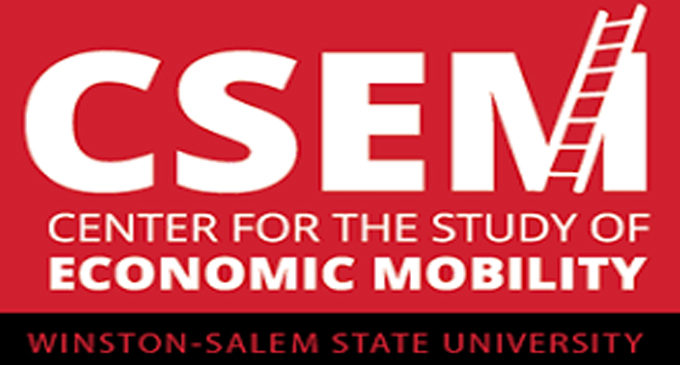Increasingly refined data can pave way for upward economic mobility

By Russell Smith and Zachary Blizard
At Winston-Salem State University’s Center for the Study of Economic Mobility (CSEM), data is one of our bedrocks. The data we have collected and analyzed regarding public transportation and education in Forsyth County has helped to define the dialogue on those issues for our community, but CSEM has not stopped there. New data is consistently being created, collected, analyzed and explored. One of the fields in which our data collection is advancing most rapidly – and pointing most definitively to solutions – is that of spatial justice.
Spatial justice is an emerging field of study that seeks to bring together multi-disciplinary perspectives to help resolve longstanding geographical inequalities impacting Winston-Salem and numerous other communities across the globe. CSEM has, almost since its inception three years ago, supported research to resolve these challenges through its emphasis on one type of spatial injustice — economic mobility. Economic mobility is at its core a spatial justice issue, since research has proven that one of the largest factors impacting a person’s ability to climb the ladder of economic success is geography.
As a result, we were interested to find out how specific geographic attributes might impact economic mobility at the sub-county level. A policy paper we published on the CSEM website in 2019, focused on this question and stated that a county ranked third from the bottom nationally in terms of economic mobility is also home to “North Carolina’s fifth largest municipality, two Fortune 500 companies, and several institutions of higher education. Consequently, it is difficult to comprehend how climbing the economic ladder in Forsyth County could be so difficult” (Equality of Opportunity, https://www.wssu.edu/academics/colleges-and-departments/college-of-arts-sciences-business-education/center-for-study-of-economic-mobility/our-research/_files/documents/urban-form-policy-paper-issue-3.pdf).
The 2019 study built upon previous research from across the nation and sought to explore how local urban geographies impact economic mobility at the census tract level. To accomplish that, we measured the association among various spatial indicators of urban form including sprawl, the number of brownfields, and the number of bus stops against levels of economic mobility for each census tract in Forsyth County. We factored in the influence of other potentially important variables, such as racial segregation and the share of a population that utilizes public transportation for commuting.
The results we found were illuminating. For example, “In Forsyth County, a 100-unit reduction in sprawl is associated with an increase in the probability of upward mobility for the residents at the bottom of the income ladder of around 5 percent. This is as if Rural Hall went from its current level of compactness to a level similar to downtown Winston-Salem. … As sprawl decreases (associated with increasing levels of compactness … a more urban environment), economic mobility tends to increase.” It was evidence worth putting before policymakers and the rest of the public, and even more refined data is pending as we continue to cooperate on research.
Professor Russ Smith, a CSEM Research Fellow and the faculty lead for the Spatial Justice Studio, also works with WSSU’s new Center for Applied Data Science. Through the center, Smith will work on a Spatial Justice Index, seeking to create a methodology by which a wide range of spatial justice issues can be quantitatively explored at the same time. Potential variables that will be included in the index include measures of education, environment, health care, transportation and access to healthy food. These issues have been aggravated by the current public health pandemic, social and racial unrest, and decades of spatial inequality.
Zach Blizard, CSEM’s research manager, continues to work with Smith and other CSEM Fellows as he explores a myriad of issues. Currently, we are analyzing the impact of political fragmentation on racial segregation. We hope to understand whether increases in the number of municipalities in a given metropolitan area results in a more racially segregated geography. The data used in this study was created from a wide variety of sources, including the U.S. Census, Brown’s Diversity and Disparities Project, the Bureau of Labor Statistics, FRED Economic Database. Though this isn’t focused directly on Winston-Salem/Forsyth County, the findings of this study have ramifications for the organization of local government structure and potentially impacts residents’ economic wellbeing.
As CSEM continues to work on a variety of different projects, a greater number of datasets will be created and stored in our newly established database. Recognizing the importance of using data and empirical evidence to scientifically test hypotheses on challenges facing our community is key to finding solutions to complex questions. Ultimately, we hope these datasets will enable qualified community researchers to have access to a treasure trove of information.
Russell M. Smith is a professor of geography and the faculty lead for the Spatial Justice Studio @ CDI, where he works on research related to spatial inequalities in the local community.
Zachary D. Blizard is the research manager at the Center for the Study of Economic Mobility, where he works on quantitative social science research related to economic mobility in Forsyth County, N.C.















